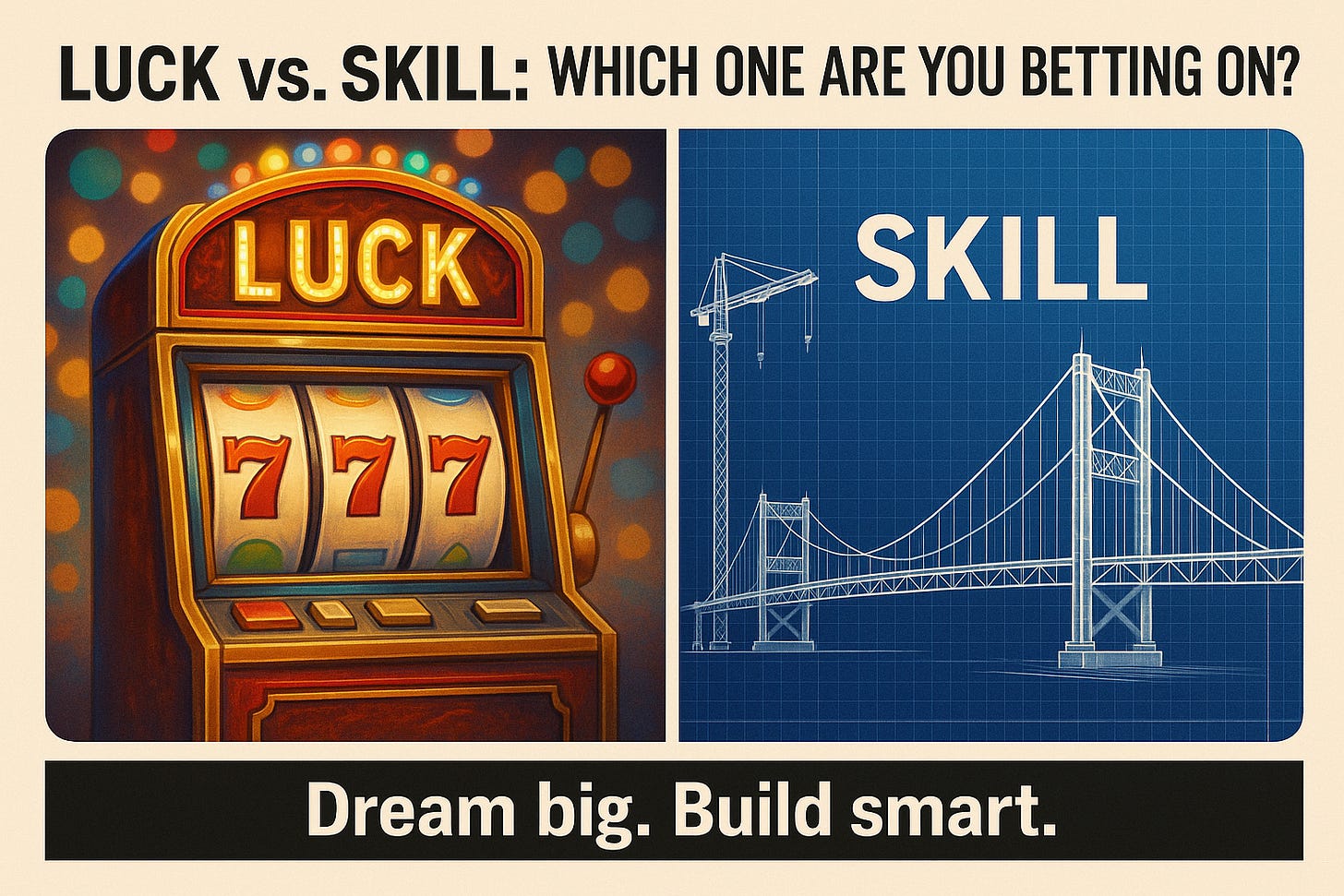The Dangerous Addiction to Miracle Stories
Why 'Playing It Smart' Beats 'Getting Lucky' in Business and Writing
The Dangerous Addiction to Miracle Stories
We love to believe that one bold move can change everything.
The entrepreneur who raised millions after one impromptu pitch.
The writer who launched a Substack newsletter and exploded to 50,000 subscribers overnight.
The leader who gambled everything on a crazy idea, and somehow saved the company.
These stories are magnetic because they tap into something primal: the dream that we too can beat the odds with one big, daring move.
But there’s a quiet danger behind this obsession: it teaches the wrong lesson, that success is about audacious risk-taking, not patient strategy or disciplined execution.
We end up glorifying risk for its own sake, forgetting that for every miracle story we hear, there are a thousand silent failures we don’t.
"Luck is never a strategy. It's a moment."
If we want to build anything meaningful, leadership influence, a business, a creative body of work, we have to break free from the myth of the overnight success.
Because we do not see everything…
Survivorship Bias at Work
For every unicorn story, there’s a hidden graveyard of others who tried the same risky moves and lost.
The founder who pitched the same bold idea... and went bankrupt six months later.
The writer who poured their heart into a launch... and heard nothing but crickets.
The leader who made a bold call... and watched the company spiral into chaos.
We don’t hear about them.
Why? I’m sure you know.
Because failure doesn’t get press coverage. It doesn't sell books. It doesn’t fill conference halls.
This is survivorship bias, the human tendency to notice only the winners and ignore the losers. It creates a distorted view of reality, making success look like a function of gutsiness alone, rather than what it really is: a delicate mix of timing, preparation, iteration, and yes, a sprinkle of luck.
If you model your life and business on these outlier stories, you’re not leading — you’re gambling.
And gamblers don’t build legacies.
When We Win, It’s Genius… When We Lose, It’s Bad Luck
There’s a dangerous mental shortcut that traps even the smartest leaders and creatives:
When we win, we think it was because of our brilliance.
When we lose, we blame the market, the timing, the team, the audience.
It’s a comforting story. It protects our ego.
But it kills our growth.
True leadership, true craftsmanship, and true business acumen come from honest reflection.
From asking:
What worked and why?
What failed and what did I miss?
How can I de-risk this next move even further?
In leadership, overconfidence after a few wins can make decision-makers reckless.
In writing, a sudden viral moment can make you think you’ve cracked the code, when often it was just the right topic at the right time.
"Pride goes before destruction, and a haughty spirit before a fall."
— Proverbs 16:18
Humility is the superpower that turns temporary wins into lasting impact.
The Boring Reality: Greatness Is a Long Game
Want to know what greatness actually looks like?
It’s slow.
It’s repetitive.
It’s often invisible to the outside world.
Publishing your 47th newsletter when you only get 10 responses.
Leading your team through a dozen small, unglamorous improvements.
Shipping version 3.7 of your product, knowing it’s not "the big one," but that it gets you closer.
"By patient endurance you will gain your lives."
— Luke 21:19
Consistency, not charisma, builds greatness.
Faithfulness, not flashes of brilliance, lays the foundation for true influence.
This is the paradox:
The people we think of as "overnight successes" were often quietly compounding their skills, relationships, and assets for years before anyone noticed. The ones that didn’t were such outliers that it would be impossible to emulate.
They weren’t chasing unicorns. They were planting seeds.
How to Play It Smart (Without Losing Your Fire)
If you want to stay ambitious but protect yourself from the dangerous myth of the miracle story, you have to operate differently.
Here’s how to do it:
✅ Run Small Bets:
Test your ideas on a small scale first.
Before a massive product launch, do a beta.
Before committing to a brand new writing direction, experiment with a few posts.
De-risking isn’t cowardice, it’s wisdom.
✅ Know Your Risk Profile:
Calculate what you can afford to lose.
In business, that’s cash and reputation.
In writing, it’s energy and credibility.
In leadership, it’s influence and trust.
Never bet more than you can recover from.
✅ Separate Ego from Outcomes:
Good outcome?
Be grateful, but humble.
Bad outcome?
Be analytical, not emotional.
✅ Celebrate Consistency, Not Flash:
Applaud yourself (and your team) for the daily grind.
Celebrate publishing 100 posts, not just one viral hit.
Celebrate showing up for 10 small pivots, not just one lucky rescue.
Momentum is built one disciplined decision at a time.
TLDR:
Survivorship bias warps our view of risk and success. Most big bets fail, but only winners are visible.
True growth comes from skillful management of risks, not wild gambles.
Ego-driven reactions to wins and losses stunt leadership and creative maturity.
The long game, persistent, faithful, strategic action, beats chasing miracles.
Small bets, humble reflection, and consistency form the foundation of lasting success.
What now?
Chasing unicorns is fun to fantasize about.
But building a life, a career, or a movement isn’t about jackpot moments.
It’s about bricks.
Laid carefully, laid patiently, laid persistently.
What’s one “small bet” you’re making right now that you believe will compound over time?
If you enjoyed this piece, feel free to comment, share it with a friend who’s chasing big dreams, and subscribe for more reflections like this.
Let’s build something worth talking about together.



